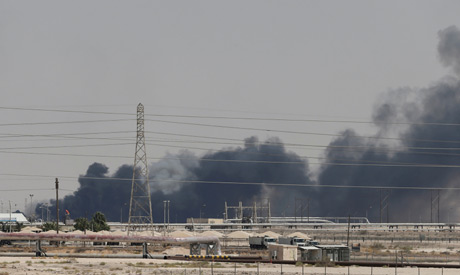
Smoke is seen following a fire at Aramco facility in the eastern city of Abqaiq, Saudi Arabia, September 14, 2019. REUTERS
The Arabian Gulf has been caught in an escalating crisis for months -- and no one is doing anything about it.
The United States has issued satellite images and cited intelligence information to back its allegation that Iran was behind the attacks on Saudi
Aramco's major oil field and refining facility.
Iran denies responsibility for the attacks, claimed by Iran-backed Houthi rebels in Yemen.
The size and sophistication of the Aramco attacks, however, point to an actor the size of a state. The attacks fit the bold pattern Iran has adopted in recent months to exercise the maximum pressure on the US and to cost the US dearly in the war in Yemen, wrote Julian Borger in The Guardian.
The attacks have cut global oil supplies by five percent -- 5.7 million barrels of crude oil a day, or more than half of Saudi Arabia's global exports. Oil prices, consequently, have skyrocketed.
Saudi Arabia is the world's top oil exporter and has been the supplier of last resort for decades.
Aramco's attacks raised the prospect of a major supply shock in a market that in recent months has focused on demand concerns due to the pressure on global growth from an ongoing US-China trade dispute.
On Monday, the prices surged by nearly 20 percent in intraday trading in response to the attacks -- the biggest hike in almost 30 years -- before closing nearly 15 percent higher than the past four-months highs.
Brent crude was down 36 cents, or 0.5 percent, at $68.66 a barrel, and West Texas Intermediate was down 57 cents, or 0.9 percent, at $62.33 a barrel. Earlier, the crude benchmarks fell by around two percent.
The attacks raised worries about the risk of more disruptions in the supply of oil at a time the global economic outlook is clouded by uncertainty.
No one can stop a slide into a wider war. The Western allies are in a rift over Iran, since the US President Donald Trump withdrew from the 2015 accord with Iran in May 2018. Even Europe is in a bitter rift since Boris Johnson became the UK's foreign secretary and sided with Trump. Europe failed to live up to their promises of protecting Iran's economy from US sanctions.
China and all oil importers are concerned about the rise of oil prices if a war was to break out in the Gulf. Nonetheless, they cannot stop the escalating regional crisis.
Short link: